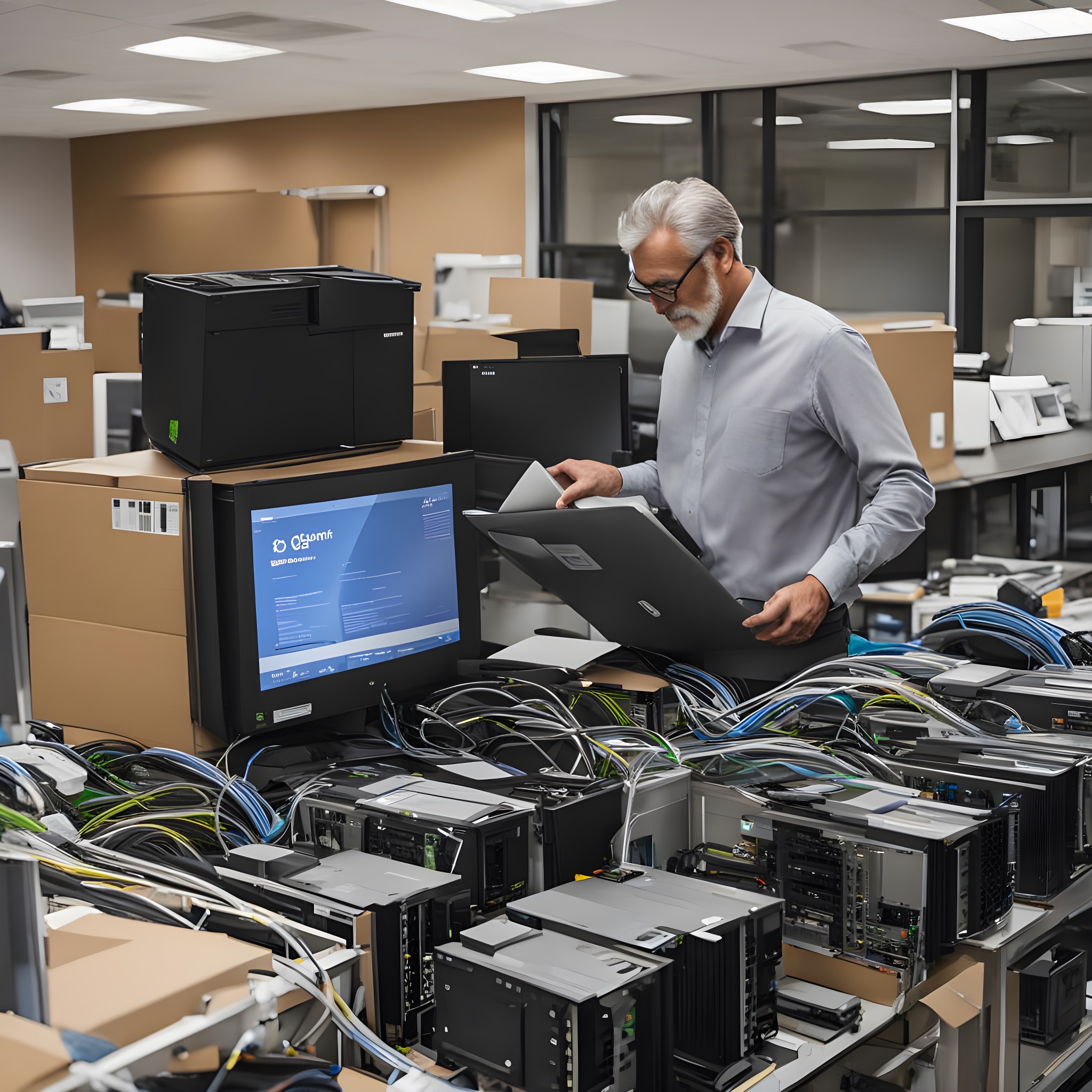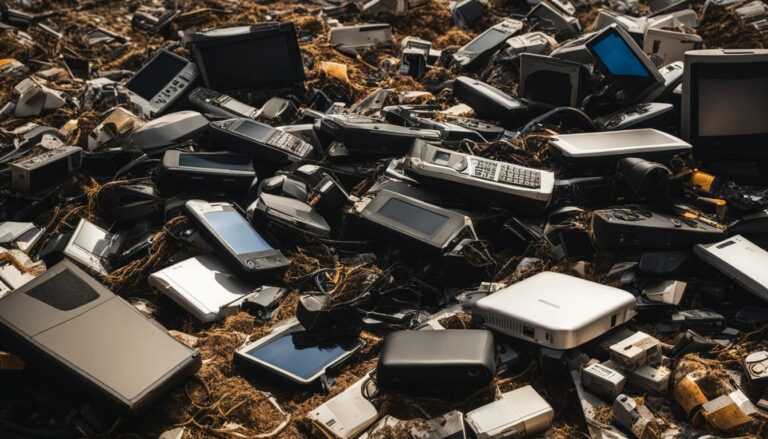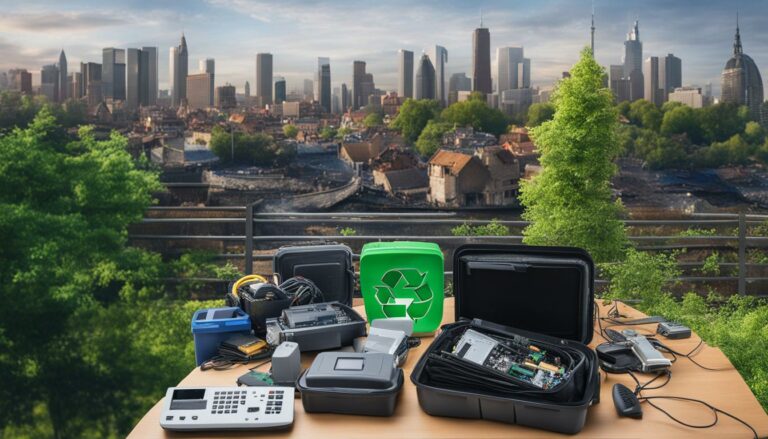The Importance of Computer Recycling in the Digital Age.
In an era where the tap of a screen can command vast virtual empires and a single keystroke can summon information from across the globe, technology, particularly computers, reigns supreme. Yet, with this digital marvel comes an environmental dilemma – a shadow of obsolescence that grows with every device we retire. As the relentless wave of technological advancements sweeps across societies, it brings with it an urgent and often overlooked question: What happens to our old devices? Specifically, how do we responsibly manage and recycle computers? As we dive into the heart of this discussion, we’ll explore the critical role of computer recyclers, the challenges of recycling computers in today’s world, and the profound impact our choices have on the environment. Welcome to the nexus of technology and sustainability: The Importance of Computer Recycling in the Digital Age.
A Look Back: Computers from Luxury to Necessity
As the digital age dawned, computers transitioned from being a luxury item for a few to an indispensable tool for the many. Over the decades, societies worldwide have witnessed a profound shift in how these machines are perceived and utilized.
The Evolution of Computer Use
The 1980s and 1990s saw computers mainly in workplaces and educational institutions. Only a select few had them at home. Fast forward to the 21st century, and computers are now household staples, crucial for work, education, entertainment, and much more. We’ve evolved from huge mainframes to portable laptops and even more compact tablets. Computer recyclers have noted that with this exponential increase in computer production and consumption, the volume of computers reaching their end of life has also surged dramatically.
Recycling Computers: Not Just an Option but a Need
Given this rapid proliferation of computers in every facet of our lives, the sheer number of devices becoming obsolete every year is staggering. While earlier, a family might replace a computer once every few years, rapid advancements in technology now make devices outdated more quickly. This trend poses a significant challenge: what do we do with these countless old machines? Simply discarding them is not viable, environmentally or ethically. As such, recycling computers has transitioned from being a mere environmentally-friendly suggestion to an absolute necessity.
Moreover, it’s not just about making space in our homes or offices; it’s about ensuring that the harmful components within computers are disposed of correctly. The role of professional computer recyclers becomes paramount here. They ensure that each device is recycled in a manner that extracts value, reduces environmental harm, and protects data. Thus, when we talk about the need to recycle computer devices, it’s not just about sustainability; it’s about responsibility – to our planet and its inhabitants.
Understanding the Scale: The Environmental Cost of E-Waste
The digital age has ushered in unparalleled technological advancements. However, it has also given rise to an environmental concern that is increasingly hard to ignore: the mounting problem of electronic waste. Among the myriad of discarded gadgets and devices, computers represent a significant proportion of this waste. The ramifications of this surge in e-waste are both alarming and widespread, affecting our ecosystems and posing health risks to humans.
Computer Recyclers: A World Drowning in Electronic Waste
Every year, the influx of new and upgraded electronic devices leads to millions of old gadgets being discarded. This cycle, while a testament to our technological prowess, also serves as a warning of the unsustainable disposal practices that have become commonplace. As we readily embrace the newest technology, we also unconsciously contribute to a world overflowing with redundant electronics. The most concerning among these are computers, which due to their components, are both a challenge and priority to handle.
The Daunting Numbers Behind E-Waste
To truly grasp the magnitude of the situation, one needs to look at the startling statistics. Annually, millions of tons of electronic waste are produced globally. Among this staggering amount, a significant percentage is made up of old and obsolete computers. This is not just a technological challenge but an environmental crisis. The increasing emphasis on the need to recycle computer units isn’t just a trend—it’s a call to action, a plea to recognize the environmental repercussions of uninformed disposal.
Computer Recyclers: At the Frontline of Tackling E-Waste
Addressing this e-waste menace are the unsung heroes: computer recyclers. Their efforts go beyond mere waste management; they serve as stewards of our environment. These professionals understand the intricacies of safely dismantling computers, ensuring harmful components don’t leach into our ecosystems. By promoting and executing effective methods of recycling computers, they play an indispensable role in mitigating the looming e-waste catastrophe. Their significance in the modern era cannot be overstated, as they not only curb environmental degradation but also pave the way for sustainable technological advancements.
Computer Recyclers: The Intricacies of the Computer Recycling Process
In the midst of the digital era, with devices being frequently replaced and updated, the need for responsible disposal has never been more pressing. The process to recycle computer units isn’t simply about dumping old machines; it’s a detailed procedure ensuring efficient resource use and environmental protection. This section delves into the sophisticated journey of computer recycling, shedding light on each phase and the importance of professional handling.
Beyond the Power Button: What Happens to Discarded Computers
The fate of a discarded computer is far more intricate than most imagine. Instead of languishing in a landfill or being incinerated – both environmentally harmful options – computers can embark on a recycling journey. This process ensures their valuable components are reclaimed, and harmful substances are responsibly managed. But, what does this journey look like?
Recycle Computer Components: A Step-by-Step Breakdown
- Collection: The journey begins when devices are collected from businesses, institutions, or individuals. Specialized bins or drop-off points are set up by computer recyclers to facilitate this.
- Initial Sorting: Upon reaching the recycling facility, computers are sorted based on their type and condition. This step determines if a computer can be refurbished or if it will proceed to component recycling.
- Manual Dismantling: Skilled technicians manually disassemble computers, segregating components like hard drives, RAM, processors, and motherboards.
- Component Treatment: Metals such as gold, silver, and copper are carefully extracted using both chemical and mechanical processes. Other elements, like plastics, are processed separately for reuse.
- Hazardous Material Handling: Critical attention is given to components containing harmful substances, ensuring they don’t contaminate the environment. For instance, batteries containing cadmium or mercury are treated with utmost care.
- Repurposing and Reselling: Materials recovered from the recycling process might re-enter the production cycle, drastically reducing the need for new raw materials.
Ensuring Data Safety While Recycling Computers
One primary concern many people have is data security. With hard drives housing sensitive information, the fear of data breaches during the recycling process is valid. However, professional computer recyclers prioritize data safety. Before any recycling or refurbishing takes place, all data storage devices undergo rigorous data destruction procedures, ensuring no traces of personal or business information remain. This commitment to data safety underscores the importance of choosing certified and reputable recyclers, emphasizing their pivotal role in not just environmental protection but also data security.
Making Recycling Accessible: Bridging Users and Recyclers
As the world races towards an era of heightened digital reliance, it’s crucial to parallelly prioritize environmental sustainability. To ensure responsible disposal and recycling of our electronic devices, a streamlined connection between users and computer recyclers becomes imperative. Let’s explore how modern-day initiatives are bridging this gap, offering solutions that are not only eco-friendly but also user-friendly.
Simplifying the Complex World of E-Waste Management
The world of e-waste can appear daunting to the average consumer. The myriad of questions, from “How do I dispose of my old PC?” to “Are there any nearby facilities to recycle computer devices?”, can overwhelm and deter many from acting responsibly. However, recent advancements and initiatives aim to demystify this complex arena, simplifying e-waste management for all.
How Modern Platforms Connect Users to Computer Recyclers
In a digital age, solutions often lie in technology itself. A rising number of platforms and apps are now dedicated to guiding users through the recycling process:
- Locational Services: Through geolocation features, these platforms can quickly point users to the nearest recycling computers facility or drop-off point, ensuring that disposing of e-waste becomes as convenient as purchasing new devices.
- Information Portals: Providing users with insights into the recycling process, what happens to their devices, and the environmental impact of their choices.
- Trustworthiness Metrics: Platforms can offer reviews, certifications, and ratings for various recyclers, ensuring users can trust the facility they’re handing their devices to.
- Scheduling Services: Some platforms allow users to schedule pick-ups, ensuring busy schedules are no longer a hindrance to responsible disposal
Case Studies: Successful Initiatives Promoting Recycling Computers
Several regions and organizations worldwide are showcasing how effective strategies can bring about a significant positive change:
- European WEEE Directive: The Waste Electrical and Electronic Equipment Directive in Europe has been pivotal in boosting recycling rates, setting collection, recycling, and recovery targets for all types of electronic goods.
- Tech Giants Taking Charge: Companies like Apple and Dell have initiated take-back programs, encouraging users to return old devices for proper recycling.
- E-Stewards Certification: An initiative ensuring that recyclers adhere to responsible recycling standards, prioritizing both environmental and data security.
- Urban Mining in Japan: A commendable initiative where electronic devices are ‘mined’ for valuable metals, showcasing a perfect blend of sustainability and economic advantage.
Looking Ahead: The Future of Computer Recycling
The onward march of technology is relentless. As innovations emerge and devices evolve, so does the very nature and scale of e-waste. Given the rapid proliferation of electronic devices, it’s crucial to cast an eye to the future and understand how the landscape of computer recycling will be influenced. This will ensure that as technology pushes boundaries, sustainability doesn’t take a backseat.
Emerging Technologies and Their Impact on E-Waste
The digital age continually ushers in groundbreaking technologies, each with its own set of challenges and requirements when it comes to disposal and recycling. It’s not just about recycling computers anymore; it’s about adapting and evolving to accommodate the ever-changing tech ecosystem.
Addressing the E-Waste from IoT, AI, and More
The Internet of Things (IoT) and Artificial Intelligence (AI) are two dominant forces shaping our modern world. With IoT, everyday devices become smarter, interconnected, and unfortunately, have a shorter lifespan. AI, on the other hand, often requires specialized hardware which can become obsolete as algorithms and requirements advance.
- IoT: As more devices become ‘smart’ and interconnected, it means more electronic components to recycle. Whether it’s a smart fridge, thermostat, or wearable device, each comes with its unique recycling needs.
- AI Hardware: AI-focused chips and specialized devices might require tailored recycling computer methods to ensure valuable components are salvaged and harmful elements are safely disposed of.
The challenge lies in predicting and preparing for the specific e-waste generated by these technologies, ensuring that we’re not caught off-guard by a sudden influx of new types of waste.
Preparing for Tomorrow: Scaling Up Computer Recyclers’ Operations
As technology broadens its horizons, computer recyclers must be at the forefront, ready to address the ever-growing mountain of e-waste. This means:
- Expanding Facilities: As the sheer volume of electronic waste grows, recyclers need to ensure their facilities can handle the load, both in terms of quantity and variety.
- Investing in R&D: Understanding the intricacies of new devices and developing methods to effectively and safely recycle them will be pivotal.
- Public Awareness Campaigns: Computer recyclers should be proactive in educating the public about the importance of recycling computers, especially as new types of devices enter the market.
- Collaboration with Tech Companies: Building partnerships with tech giants can facilitate better recycling practices from the design phase itself, ensuring devices are built with their end-of-life in mind.
The future of computer recycling will undoubtedly be complex, but with foresight, innovation, and a commitment to sustainability, it’s a challenge that can be met head-on.
Conclusion
The digital revolution has transformed our world, but it has also ushered in pressing challenges, notably the surge in e-waste. As we stand at this juncture, a sustainable path forward requires a united effort.
The Road Ahead: Taking Collective Responsibility
- Manufacturers: Innovation should not come at the expense of the environment. Prioritizing recyclable designs and eco-friendly materials can curtail e-waste production.
- Consumers: Every decision to purchase or discard technology leaves an impact. Embracing recycling computers isn’t just a choice; it’s an imperative for our planet.
- Computer Recyclers: These key players are pivotal in ensuring our discarded tech doesn’t harm our ecosystems. Their role in shaping a sustainable digital landscape cannot be understated.
In essence, the promise of a green digital future is in our hands, and collective responsibility is the key to unlocking it.
In light of these considerations, we encourage readers to further explore the topic of electronic waste and its environmental implications on Wikipedia, a comprehensive resource that underscores the collective responsibility we hold in the digital age
















More